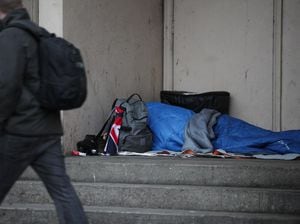Walsall Council given £500,000 to help the homeless
More than half a million pounds will be handed to Walsall Council to tackle rough sleeping.

Walsall Council has been awarded £555,837 from the Government after a successful bid to continue its work with rough sleepers in the borough.
The Ministry of Housing, Communities and Local Government awarded the council the second highest local authority allocation in the West Midlands with only Birmingham City Council receiving more.
The money will continue to support the Rough Sleeper Initiative in Walsall and wider wraparound services.
This includes the temporary accommodation at the town centre’s night shelter and support from the Outreach Navigator Service – a council partnership that helps rough sleepers access health care and suitable accommodation.
The Rough Sleeper Initiative also complements Walsall’s Housing First service which helps former rough sleepers into tenancies.
The service also provides the option of linking in with professional support to address any addiction issues.
In the last two years nearly 50 people have been housed in Walsall, while the number of recorded rough sleepers in the borough has decreased from 26 in 2016 to six in 2019.
Councillor Adrian Andrew, deputy leader at Walsall Council, portfolio holder for regeneration and strategic housing, said: “We are very pleased that MHCLG has awarded us our full bid. Rough sleepers are amongst the most vulnerable people in society and this award will help them get the expert and continued help that they need.
"We know from wider evidence based research that with continued and targeted care from specialist health and housing partners, lives can be saved, and changed by sustainable steps that lead to more hopeful futures.
“But there is still much work to be done. The reasons behind the issue are complex and will often include addictions and family breakdowns.
"The council can only do so much on its own, it’s partnership that is the key. The contribution of the voluntary, housing association, and health sectors has been incredible.”





